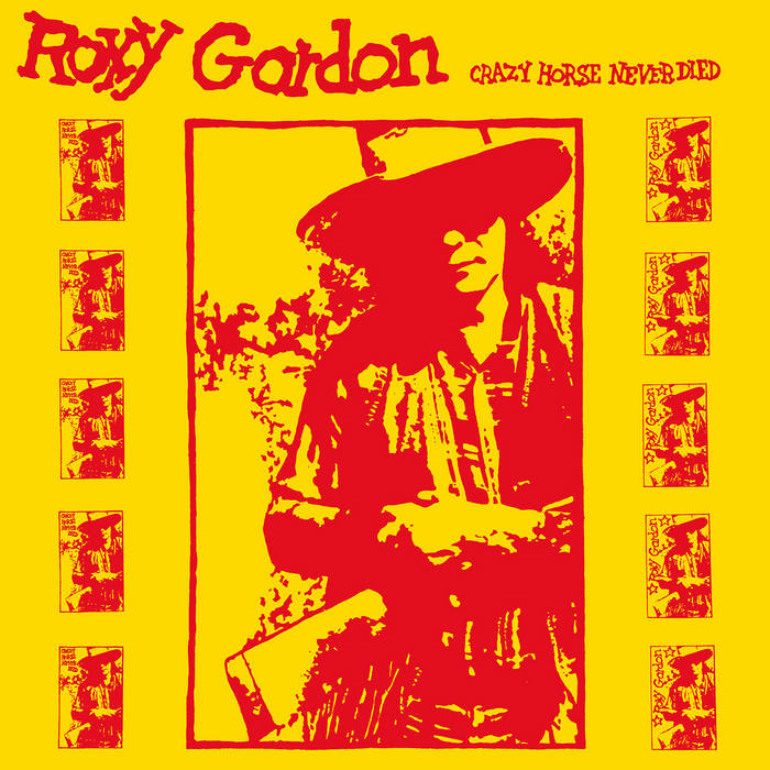

The Exploration of Abandoned Frontiers of Beauty
Paradise of Bachelors has released a remastered version of Roxy Gordon’s (First Coyote Boy) Crazy Horse Never Died. An avid writer and storyteller, Roxy Gordon was from Texas and identified “as mixed Choctaw and Scottish-or half Choctaw, half Texan.” After marriage Gordon would go on to spend time with the Assiniboine communities further acknowledging his Native American ancestry.
The album begins and ends with an evanescent howl. It is enticing and eerie in its ability to dissolve into the first track of the album. Gordon addresses racial injustice, genocide, domestic violence and dissonance of identity. Leading with inspiration from his personal life, Gordon recites like a slam poet amidst the keyboard, guitar and washtub bass.
In “Crazy Horse is Alive,” the poem is dedicated to a Syrian man Gordon met in America and is an ode to the similarities between their cultures. An ode to those whose land, culture and autonomy was stripped from them. Gordon addresses the conflict between Crazy Horse and “the white man” by acknowledging a God complex in contrast to “the pagans” as Native Americans were deemed, further isolating them as the “other.” This “other” allocation implies a culturally valid reason to attack them in the eyes of the perpetrators. It is a strong introduction to the themes of the album, enamored by visceral keyboard.
Gordon laments on his childhood in “Junked Cars.” Reading more so as an elegy, Gordon demonstrates his poeticism as he repeats the refrains at the beginning of each stanza. This repetition of “I spent,” and “I hunted,” overlaps the young Gordon in the poem slowly beginning to realize the consequences of materialism in a modern world. At first, he is looking for human signs, then rusty signs, then treasuring them in the ruins of a civilization. It is as if piece by piece he discovers beauty in desolation.
In “Living Life as a Living Target” Gordon compares the life of a prairie dog to a human. The common denominator being that they both at some point become the target and are “eaten.” He speaks to the resiliency of the few that “never get caught.” Then the fear and threat of extinction or in humans, genocide. The keys, in a staccato electronic beat, are accentuated by the low thrum of the washtub bassline and the enticement of sliding keys throughout.
“I Used to Know an Assiniboine Girl” is a commentary on misogyny and racial discrimination in the justice system. Inspired by “an Indian girl up north…” who at 19-years-old was returning from boarding school. He establishes her early on as a woman who wanted more out of life. A common theme, the American dream. After beating her husband, who often drunkenly beat her, she was sentenced to 50 years in a penitentiary by a judge discriminatory towards Native Americans. Gordon accentuates the song, often mostly in spoken word, with breathy vocals which adds to the heartfelt exasperation.
The “Hanging of Black Jack Ketchum,” in the style of a classic country western, is the story of Black Jack’s sister. The soft thrum of the bass beneath the guitar as enticing as the first chords of Fleetwood Mac’s “Landslide.” Although, it is a grim message of his sister devoutly praying “to get through the dying” is wrought with impending death. Those alive must pray to help themselves cope, not so much the dead or dying.
“The Texas Indian”, is an a cappella folk song Gordon wrote from the perspective of the Native American in the original “Texas Ranger.” He distinctly evokes the determination and steadfastness of Native American Culture.
In “Why Do I Miss Someone?” the overarching chord progression is offset by the timbre of the keys, while Gordon leans into his Texas roots with country vocals. The elevation of his voice is often wrought with melancholy and woeful self-examination. As he “follow[s] winding roads,” he rectifies leaving with the words “indecision is the sin.” The man is desperately looking for something he does not know of, while satisfying his cravings with “one more good time.”
At the albums close and as the pack howls and disappears into the night, so does Gordon.
